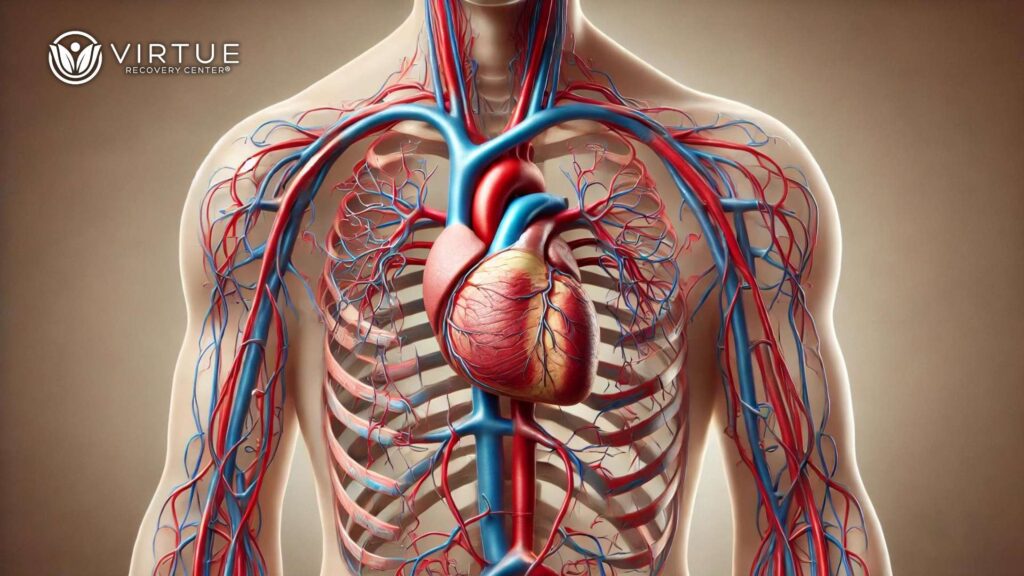Alcohol has a complex relationship with the cardiovascular system, with both potential benefits and significant risks depending on the amount consumed. While moderate alcohol intake may offer some protective effects against certain types of heart disease, heavy drinking and chronic alcohol use can lead to severe cardiovascular problems, including heart failure and high blood pressure. This article explores the impact of alcohol on the cardiovascular system, the risks associated with varying levels of alcohol consumption, and the importance of making informed choices about alcohol use for heart health.
Key Takeaways
- Moderate alcohol consumption might have some protective effects on the cardiovascular system, but these benefits are often outweighed by the risks associated with heavy drinking.
- Excessive alcohol consumption significantly increases the risk of heart disease, heart failure, and other cardiovascular issues.
- Understanding the effects of alcohol on the cardiovascular system is crucial for making informed decisions about alcohol use and maintaining heart health.
Introduction
Alcohol is a substance that many people consume socially, and it plays a significant role in various cultural and social settings. However, the impact of alcohol on the cardiovascular system is a topic of growing concern among health professionals. While some studies suggest that moderate alcohol consumption might have certain benefits for heart health, excessive and chronic alcohol use is widely recognized as a major risk factor for heart disease and other cardiovascular conditions. This article examines the effects of alcohol on the cardiovascular system, highlighting the risks associated with different levels of alcohol consumption and the importance of maintaining a balanced approach to alcohol use.
Understanding the Cardiovascular System and Alcohol
How Alcohol Affects the Cardiovascular System
The cardiovascular system, which includes the heart, blood vessels, and blood circulation, is crucial in maintaining overall health. Alcohol consumption directly impacts this system in several ways. When you consume alcohol, it enters your bloodstream and can affect your heart rate, blood pressure, and the function of your heart muscle. Moderate alcohol consumption might help protect the heart by increasing “good” HDL cholesterol and reducing the formation of blood clots, which can lower the risk of coronary heart disease. However, these potential benefits are countered by the risks associated with higher levels of alcohol intake.
The Impact of Moderate Alcohol Consumption
Moderate alcohol intake, often defined as up to one drink per day for women and up to two drinks per day for men, has been associated with a lower risk of developing coronary artery disease and some other cardiovascular conditions. Research from organizations like the National Institute on Alcohol Abuse and Alcoholism (NIAAA) suggests that moderate drinking might offer some protective effects, such as increasing good cholesterol and reducing the likelihood of clot formation. However, it’s important to note that these benefits are only observed with moderate drinking and can be overshadowed by the risks if consumption increases.
The Risks of Heavy Drinking on Cardiovascular Health
Heavy Drinking, Heart Disease, and Heart Failure
The relationship between alcohol consumption and heart disease becomes increasingly detrimental as the amount of alcohol consumed rises. Heavy drinking, defined as consuming more than three drinks per day or binge drinking, significantly raises the risk of developing cardiovascular problems. Excessive alcohol intake can lead to heart failure, damage to the heart muscle (cardiomyopathy), and an increased risk of coronary heart disease. The National Institutes of Health warns that heavy alcohol use is one of the leading preventable causes of cardiovascular mortality, highlighting the importance of limiting alcohol consumption to protect heart health.
Alcohol and High Blood Pressure
High blood pressure (hypertension) is a major risk factor for heart disease and stroke, and alcohol use is known to contribute to elevated blood pressure levels. The more alcohol you consume, the greater the risk of developing hypertension. Even occasional binge drinking can cause spikes in blood pressure, which, over time, can lead to chronic hypertension and increased cardiovascular risk. The National Institute on Alcohol Abuse and Alcoholism notes that long-term excessive drinking can lead to persistent high blood pressure, which significantly increases the risk of heart disease, stroke, and other serious cardiovascular events.
Public Health Concerns
From a public health perspective, the risks associated with alcohol abuse are substantial. Excessive alcohol consumption is linked to a higher incidence of cardiovascular disease and contributes to a significant number of deaths each year. Public health initiatives emphasize the importance of understanding the dangers of chronic alcohol consumption and the impact it has on cardiovascular health. Health agencies like the National Institutes of Health continue to conduct research and provide guidelines to help individuals make informed decisions about their alcohol intake to minimize the risk of heart disease and other health conditions.
The Role of Alcohol in Cardiovascular Disease Prevention and Risk
Is There a Safe Amount of Alcohol?
One of the most frequently asked questions is whether there is a safe amount of alcohol that can be consumed without harming cardiovascular health. While some studies suggest that moderate alcohol consumption might offer cardiovascular benefits, these benefits are not guaranteed and can vary based on individual health factors. Additionally, what is considered “moderate” can differ from person to person, and for some individuals, even small amounts of alcohol can be harmful. The relationship between alcohol consumption and heart health is complex, and it’s important to weigh the potential benefits against the well-documented risks of excessive drinking.
The Impact of Alcohol Withdrawal
For individuals who have been consuming alcohol heavily over a long period, alcohol withdrawal can pose additional risks to cardiovascular health. Withdrawal symptoms may include increases in blood pressure and heart rate, which can strain the cardiovascular system and potentially lead to complications such as heart failure in those with existing heart conditions. It is crucial for individuals undergoing alcohol withdrawal to do so under medical supervision to manage these risks effectively and ensure a safe transition to sobriety.
Long-Term Effects of Alcohol on the Cardiovascular System
The long-term effects of alcohol on the cardiovascular system can be severe, especially in individuals who engage in regular and excessive drinking. Over time, chronic alcohol consumption can lead to irreversible damage to the heart and blood vessels, increasing the risk of conditions such as coronary artery disease, heart failure, and stroke. The cumulative impact of alcohol on the cardiovascular system underscores the importance of early intervention and making lifestyle changes to prevent further damage.
Conclusion
The effect of alcohol on the cardiovascular system is a critical consideration for anyone concerned about heart health. While moderate alcohol consumption may offer some protective benefits, these potential advantages are often outweighed by the risks associated with heavy drinking. Excessive alcohol consumption can lead to serious cardiovascular problems, including heart disease, high blood pressure, and even heart failure. Making informed decisions about alcohol intake is essential for maintaining a healthy heart. If you or someone you know is struggling with the impact of alcohol on their health, Virtue Recovery Chandler is here to help—contact us at 866-338-5779 to learn more about our comprehensive treatment programs.
FAQs
How does alcohol affect the cardiovascular system?
Alcohol affects the cardiovascular system by influencing heart rate, blood pressure, and the function of the heart muscle. While moderate alcohol consumption might have some benefits, excessive drinking can lead to significant cardiovascular problems.
What are the risks of heavy alcohol consumption on cardiovascular health?
Heavy drinking increases the risk of heart disease, heart failure, high blood pressure, and other cardiovascular issues. It can cause long-term damage to the heart and blood vessels.
Can alcohol withdrawal affect the cardiovascular system?
Yes, alcohol withdrawal can lead to increases in blood pressure and heart rate, which can strain the cardiovascular system, especially in those with existing heart conditions. Medical supervision is essential during withdrawal.
What are the long-term effects of alcohol on heart health?
Long-term alcohol consumption can lead to irreversible damage to the heart and blood vessels, increasing the risk of coronary artery disease, heart failure, and stroke.
What is the correlation between alcohol and coronary artery disease?
Excessive alcohol consumption is linked to an increased risk of coronary artery disease (CAD) due to its potential to raise blood pressure, contribute to unhealthy cholesterol levels, and cause inflammation of the arteries. However, moderate alcohol intake has been associated with a lower risk of CAD in some studies, though this benefit is controversial and should not be used as a justification for drinking.
What is the correlation between alcohol and hypertension?
Regular and excessive alcohol consumption can lead to hypertension (high blood pressure), as alcohol can cause the blood vessels to tighten and raise the heart rate. This effect increases the workload on the heart and arteries, contributing to the development of chronic hypertension.
Can alcohol do damage to the cardiovascular system?
Yes, alcohol can cause significant damage to the cardiovascular system. Excessive drinking can lead to high blood pressure, heart rhythm abnormalities, weakened heart muscle (cardiomyopathy), and an increased risk of stroke, all of which negatively impact cardiovascular health.
What is the correlation between alcohol and cardiovascular disease?
There is a strong correlation between heavy alcohol consumption and cardiovascular disease (CVD). Chronic drinking can contribute to various CVDs, including hypertension, coronary artery disease, cardiomyopathy, and stroke, increasing the overall risk of heart-related complications.
What is the correlation between alcohol and heart failure?
Excessive alcohol intake is a significant risk factor for heart failure, as it can lead to cardiomyopathy, where the heart muscle becomes weakened and less efficient at pumping blood. Over time, this can result in heart failure, a condition where the heart cannot meet the body’s demands for blood and oxygen.
What are the cardiovascular effects of alcohol consumption according to the statistics from Chandler, Arizona?
Recent insights from chandler drug statistics revealed that alcohol consumption can have significant cardiovascular effects. The data indicated that heavy drinking can lead to hypertension, irregular heartbeats, and increased risk of heart disease. It’s important to be aware of these findings and make informed choices about alcohol consumption for a healthier heart.
Resources
https://www.ncbi.nlm.nih.gov/pmc/articles/PMC6826791/
https://www.ncbi.nlm.nih.gov/pmc/articles/PMC5513687/
https://www.ahajournals.org/doi/full/10.1161/01.hyp.0000164627.01274.ec
https://www.medicalnewstoday.com/articles/is-alcohol-bad-for-your-heart
https://www.ahajournals.org/doi/full/10.1161/CIRCULATIONAHA.115.019743








